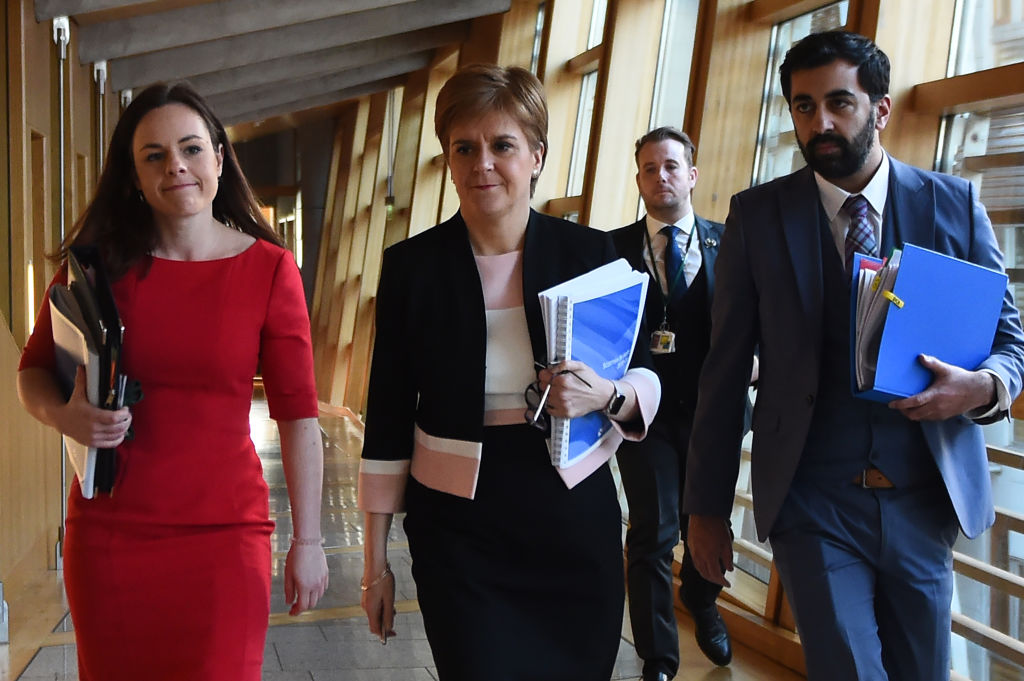They’re all the same, politicians. How often have we heard this before? We need a real choice, people often say. Well, we have it now; or at least members of the Scottish National party do. If you’ve been watching the televised debates, of which there have now been four, you’d be forgiven for thinking that this is a contest between three members of different political parties, only one of whom belongs to the government of the day.
The two front-runners for the crown, health secretary Humza Yousaf and finance secretary Kate Forbes, have adopted polar opposite strategies in this leadership contest, and offer their party and their country an entirely different vision for the way forward on almost every key issue.
Yousaf is the party’s chosen one. A protégé of First Minister Nicola Sturgeon, the implicit choice of her and the party establishment, and now the explicit choice of her deputy John Swinney, he has enthusiastically adopted the role as the high protector of the government’s record in office, and of its coalition (sorry, ahem, ‘Cooperation Agreement’) with the Greens.
Forbes, on the other hand, has become a pariah in the eyes of the party’s hierarchy. She has laid into the government’s record on public services – no accident that Humza’s brief, the NHS, has been in her crosshairs – and has delivered a brutal assessment of the country’s economic performance. Her disdain for the Greens (readers should be aware that Scotland’s Greens are significantly to the left of England’s Greens on economic matters, and are more driven by social policy than their southern counterparts) is barely hidden.
This has manifested itself in an all-or-nothing strategy for both candidates. Yousaf’s eggs are all in the basket marked ‘membership’. His strategy is to harvest the membership’s affection for Sturgeon, defend her record and adopt the role as the continuity successor, even if that reduces his credibility in the country at large. His audience is party members, and only party members, and his hopes are based on enough of them having enough loyalty to the existing regime to anoint its successor.
Forbes’ eggs, conversely, are in the basket marked ‘country’. Her strategy, ironically, is actually the one with the most focus on independence. She is telling SNP members what they need to hear, not what they want to hear; I am more popular out there in the country, amongst people who currently vote for other parties and who currently oppose independence, and although I may not tick all of your boxes, I do tick theirs, and that means I can win independence. It is a high-risk, high-reward strategy, the first part of which is working: she is well ahead of Yousaf amongst the general public.
This is, of course, of great consequence to all of us living in Scotland. A Forbes government is, first and foremost, a minority government. If the Greens don’t abandon her because of her social conservatism, she will discard them because of their turbocharged socialism. It is a government whose top priority is to release the private sector – particularly SMEs – to grow the economy and create the wealth which can then be redistributed. And it is a government which, on the face of it, will lift the lid on the system failures in the health and education services and start anew.
A Yousaf government, conversely, is a re-election of the majority coalition, and therefore the easy operation of Parliament and the smooth passing of legislation. It is a focus on the so-called ‘wellbeing economy’ and a belief that public services need money, not reform. It may not encourage its opponents to jump on board, but it will probably satisfy its own supporters, and give them reason to continue to contrast Scotland’s ‘niceness’ with the harsher climate south of Hadrian’s Wall.
So, this is a party leadership election in name only. In reality, it is a de facto general election with a clear choice between two visions; two types of country. In an ironic echo of the UK Tory party vote (twice) last year, we are all now in the hands of the SNP membership.






Comments